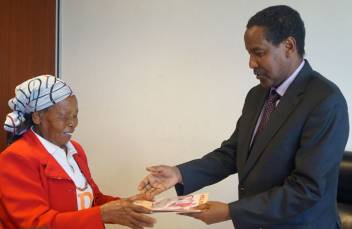 This week, Kenya became the second African country to sign Charter 14 for Older People in Disaster Risk Reduction (DRR) which calls for stronger commitments from governments, donors and other partners to prioritise older people in DRR response strategies.
This week, Kenya became the second African country to sign Charter 14 for Older People in Disaster Risk Reduction (DRR) which calls for stronger commitments from governments, donors and other partners to prioritise older people in DRR response strategies.
Ali Ismail Noor, the Permanent Secretary to the Ministry of Labour, Social Security and Services signed up to three of the 14 standards in the Charter in a ceremony attended by older leaders, HelpAge International, HelpAge Kenya and the UN Office for Disaster Risk Reduction (UNISDR).
Mr Noor also pledged bring on board other key players who could help address the issues highlighted in Charter 14.
We must not forget older people
“Older people have done so many good things for our beloved country Kenya and we should not forget them because they are older,” said Mr Noor.
The three minimum standards signed by the government of Kenya are:
- Older people have been consulted in the development of national and local disaster and climate risk assessment and their vulnerabilities and capacities included.
- Disaster supplies and stockpiles include specialist items, medication and food required by older people and are accessible to older people in emergency distributions.
- Older people’s knowledge, skills and contributions to disaster risk management are publicly acknowledged and promoted.
Charter 14 was developed by HelpAge International in partnership with UNISDR because the specific needs and strengths of older people are not recognised in DRR policies and programmes. This is despite the fact that over 10% of the world’s population is aged 60 or over.
The Charter is in line with the UN resolutions adopted by the Economic and Social Council in July 2013, that encourage Member States to strengthen national capacities, set priorities and address specific needs of older people in natural disasters and emergencies.
In need, invisible, invaluable
Charter 14 revolves around three key principles that older people’s needs must be understood and responded to, that collection of data on age and sex is essential to ensure older people’s risks are visible and the need to acknowledge older people’s knowledge, skills and wisdom.
Prafulla Mishra, HelpAge’s Regional Director for East, West and Central Africa, expressed his appreciation to the Kenyan government for addressing older people’s issues and urged them to create a follow up process to ensure their Charter 14 objectives are met. The signing of the charter comes as the Third UN World Conference on Disaster Risk Reduction is taking place in Sendai, Japan.
During the last few decades, Kenya has experienced severe floods and droughts. According to the Kenya Red Cross Society, in 2013 alone around 89,000 Kenyans were displaced by floods. The Lake Victoria basin in western Kenya is one of the most flood-prone regions in the country.
We look forward to working with governments, donors and other organisations to ensure that older people’s needs are addressed and they can live a fulfilling life in their older age.
Read more about our work on disaster risk reduction.
